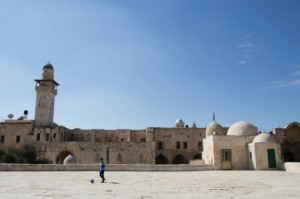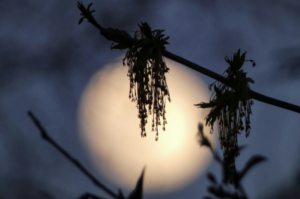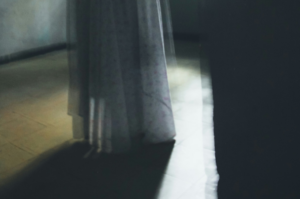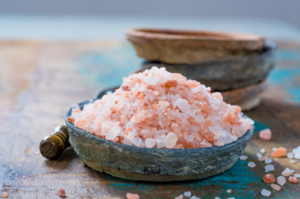
The first time I heard my mother call herself a widow, I didn’t exactly know how to feel. Everything seemed to swirl quickly, with exigent moves aimed at leaving me hollow and wanting. I suddenly felt the taste of too much salt in my mouth. I felt adrift.
It was a Sunday afternoon and we were having our lunch of normal Sunday rice when our during-meals conversation geared towards a thrift collector who has suddenly vanished from the market with people’s money in her purse — including my mother’s. My brother and I tried to keep my mother’s hope alive. We tried to make her still believe that the collector would soon show up with my mother’s money which ran into hundreds of thousands. She went silent for a while, which led my brother and me to think that maybe she’d chosen to hope for the return of her money, and then she blurted out in Igbo — the words tripping on one another as they fell out — with an abruptness that shocked me.
What she said in Igbo was, “This girl cannot eat my money oo. Haa, it can not happen. Instead, I will scoop the sand of the earth and curse her. She will not know peace for as long as her feet touch the soil, until she returns my money. God is in heaven naa, so this girl can’t eat the money of my sweat. I suffered for that money, I didn’t prostitute for it. She’ll know that it is the money of a widow that she wants to run away with.”
To be honest, the person I saw in my mother was someone I had not known in my entire life, someone totally unrecognizable to me. I saw — as she spoke — a woman who is at point zero. A woman who was almost freezing with the hotness of the country’s economy. A woman who would not say, because there was really no one to talk to, that the burden of taking care of four children was weighing down on her. I saw a woman who was almost snapping. Who had been strong all along, but who was now willing to drop the cloak of strength for a while and embrace vulnerability, if it would make her feel better. I saw, that afternoon, a woman who held strongly to the fact that what she earned honestly could never slip from her fingers — she was ready to blackmail God with her hard work.
For the next few minutes after that almost solemn monologue to God, my brother and I said nothing. I wondered to myself, but I dared not ask my brother, whether he had heard our mother call herself a widow. I had never heard that before from her mouth, had never thought I’d hear her say it while describing herself. It had been a year since my father died, and I had not given real thought to how my mother now saw herself. I had not even thought of myself as fatherless. I could not say for sure what that word ‘fatherless’ meant. I tried later that day — safe in the serenity of our living room — to draw parallel between ‘fatherless’ and ‘widow’. I tried really hard to maybe come up with a theory to explain which was more vulnerable than the other. But then that word, widow, coming from my own mother sounded so alien, very foreign. It told me that it was high time I embraced reality that my father was dead. Just look at my mother, she called herself widow, an acknowledgement that her husband was late.
I knew that I never loved Daddy the way my mother had loved him. When compared to her, I didn’t know much about the man. Yet this woman, perhaps the one who’d loved him greatest after God, had accepted a rancid reality, while I still languished in a casket of delusions. As if telling myself that Daddy wasn’t dead, kept him alive somewhere at the far end of the country.
There were times, moments and circumstances when I direly wished my father was still alive. When, on my graduation from secondary school, I had to light a candle for myself, I almost desperately wished Daddy was there. He died two months to the graduation, and mother was still in mourning, so no one graced my occasion. My elder siblings were sadly not available at the time. Only Daddy would have been unavoidably present.
Again, I wished he were there when I brought home a copy of the magazine I co-edited. A magazine I had so much talked with him about and hoped he’d read it. For days, the book lay on my desk, and it even brought vomit to my throat when I remembered that my father never got to read it. On my university matriculation, I wished he were there too. I expected his phone call to tell me he was at the gate and I could come see him. But he didn’t show up. The grave held him tight, held him in its mouth, such that the day crossed and once again, I celebrated something without him.
I remembered this matriculation feeling — that radical expectation, hoping to see what would never come — when my mother told me a story of what happened to her in the market one day. She’d priced a piece of meat and the seller told her it was not for people like her — a kind of coated innuendo that Mummy could not afford the meat or was too economical to pay the price the meat called for. Mummy laughed after the story, but the laughter didn’t linger long before a small dark shadow took over her face. “If it were me and your father that went to buy that meat, that man cannot say that thing to me.” Those words bore something heavier than lead, it spoke of a vacuum, and it massaged the head of my soul. I was not the only one missing him, after all.
But what exactly does it mean to miss someone? Is it seeing your friends and unreasonably getting jealous that their fathers are still alive? Is it reading a novel and stopping halfway because one of the characters thinly resembles your father maybe in some traits? Is it leaving the room when your roommate was on call with his father? Is it that silly voice mocking you inside your head when you spoke of your father in past tense during casual conversations? Is it that yearning that always makes you want to wear that t-shirt with your father’s face large in front of it, even when your coursemates are beginning to rumour if that’s the only cloth you have? Do you exactly miss someone when you see his friends and wonder why death didn’t take them instead and spare your love?
Still, love? How does a son love his father? You don’t see it start, if the father is caring and loving enough, you may just sense the love as it grows. But you are fully aware of its presence when it is fully grown. This is my story. The story of a boy who didn’t even know how or when he drowned in his father’s love. Yes, it is my story. The story of a boy who. doesn’t regret a minute of the paternal connection while it lasted. But some stories bully their bearers. Some stories stick like bone in the throat, neither going up nor down. Mine is one of such stories. It betrayed me. It mocked me with its elusiveness when it was time for me to write my father a tribute.
Before my father’s, I had never written a tribute before. People I knew had died, but none had been so close to me in a way that demanded I write a tribute for their burial brochures. But I had loved reading tributes, I loved how people wrote about their pains, the flowery language in which they said good-byes, I loved how people wrote the nicknames of the deceased as though the dead person could still smile at those names. I found some expressions overused and cliche, and I hoped to write a more beautifully poetic tribute when someone in my family dies. Until it really came to my turn — and I had to say bye to my big man. Then I knew words were wicked, they fled from me all the nights I stayed up to pen my own tribute. But what I remembered, how did I even have to write it? Were there specific qualities of a tribute?
My eldest brother wrote something about how he’d now begin to keep some things to himself because only Daddy could understand; my other brother wrote about legacy and image and integrity and all that. My elder sister wrote some cliché things like God knows best and Till we meet in paradise. Our last born would not even give out anything, she was too young to ‘properly ‘miss’ Daddy at that time. It was I, the small poet of the house, who was lost in his own small world of memories. I wanted to tell stories in my own tribute. I wanted to tell those who’d come for the funeral that there were days Daddy and I argued about the Queen’s English and the American. I wanted to write about that day he just showed up unannounced at my school because he had an appointment with the principal — how glowingly handsome he looked, how elevated, how proud of him I was. Maybe it was right that I wrote about his shaking hands with me in a guy-to-guy kind of way in front of my classroom block, how that singular act projected our relationship as the best, most cordial father-son relationship known in my class set. If these were not to be parts of a tribute, what should I write? That he’s in heaven? Maybe, but a part of him is still here, here in my heart and in our house.
He named his last child Chimamanda, after the Nigerian novelist, and often I think what his dreams had been while growing up. Do you know, God? Do you know why he so much admired Achebe? Do you know why he danced on the steering wheel each time we were on our way to the village? Do you know why he spared me that night I rejected my mother’s food to go out and buy suya? Do you know why he was so glad at my elder sister’s wedding? Did you know, God, as he blessed wine that day on my sister’s wedding, that it was only two years and three days to his own burial? Did you know the extent of pain he bore throughout the period of that sickness that claimed him? Did you smile at me that day I promised to take my mother out on her birthday in 2023, because you already knew that her birthday for that year would be my father’s wake keep?
My mother trusts that you know all these, yet she wants to remind you — you didn’t forget though — that she’s a widow. One who would have given up any other material thing to have her husband back, but when milk pours on the floor, we must get a rag and mop it up. It hurts. It’s like having a fish bone somewhere in your gullet, it keeps granting you occasional discomfort.
I may never know why I paused when I heard my mother call herself widow. But I felt like I was a passenger aboard a train of condolence, of grief. But I must alight now, for I don’t mourn what is alive. My big man lives, inside me, for as long as I do.
Photo by ErnAn Solozábal on Unsplash










COMMENTS -
Reader Interactions